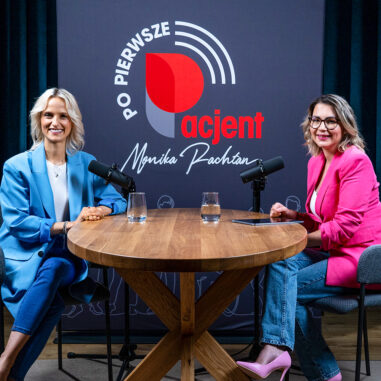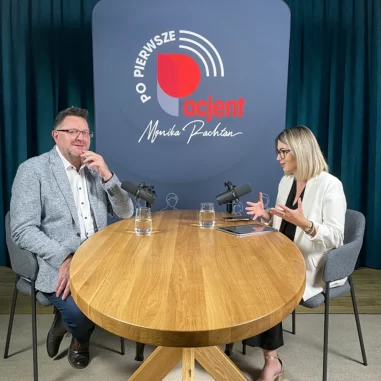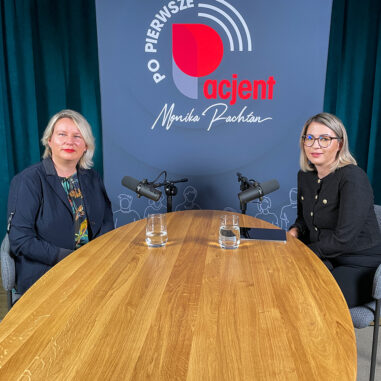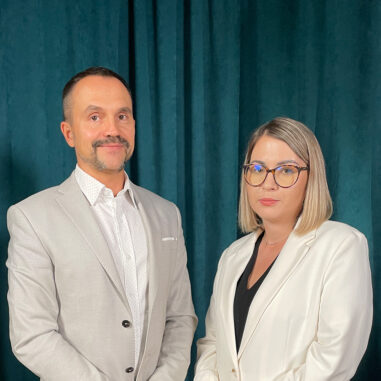
Healthy lungs. Medication is less than 50% of success. Episode 20
Why do so many Poles suffer from lung diseases? Can this state of affairs be changed? What can each of us do to protect ourselves from serious ailments that damage the respiratory system?
In the latest episode of the podcast "Patient First", Monika Rachtan talks to Prof. Robert Mroz, MD, a specialist in lung diseases. Watch the video and take care of your health and that of your loved ones.
There are approximately 22,000 lung cancer patients in Poland each year. This means that every day 60 people hear a diagnosis that dramatically changes their lives. 2 million Poles suffer from COPD (chronic obstructive pulmonary disease). Common diseases of the respiratory pack also include bronchial asthma, pneumonia and... covid. How much do we know about lung diseases? It turns out that still not enough. We believe in myths we have heard, which have little to do with reality.
An antibiotic is not a cure-all
Patients presenting themselves to the doctor with a cough, fever and general malaise - symptoms suggestive of a respiratory illness - often expect the doctor to prescribe an antibiotic. Meanwhile, viruses are responsible for most infections, including pneumonia. Administering antibiotics in a viral illness does not make you feel better or shorten the time you are ill. Refusing to write a prescription for an antibiotic is therefore not evidence of incompetence or ill-will on the part of the doctor, but, on the contrary, is evidence of care for the patient's health.
Medication is not enough to succeed in treatment
Apart from infections, the most common respiratory diseases in Poland are asthma and COPD. Patients dealing with these ailments place their hope in the medication prescribed by their doctor, believing that it will bring immediate and lasting improvement. However, specialists agree that medication is less than half the battle. Our well-being and health depend primarily on our lifestyle. Even the best therapy will not be effective if it is not supported by physical activity and a balanced diet.
Cancer is not a sentence
The respiratory disease that patients fear most is lung cancer. This cancer has become known as an extremely dangerous disease. Five-year survival rates are not encouraging: only 13.6% men and 18.5% women live five years after diagnosis. In comparison, the five-year survival rates for breast cancer and testicular cancer are around 75%. The reason for the high mortality rate from lung cancer is primarily due to late detection. When detected early, lung cancer is completely curable.
Check out our video and find out what you can do to reduce your risk of lung cancer and other respiratory diseases.
Transcription
Monika Rachtan
I would like to invite you to listen to the podcast 'Patient First'. Good morning, I'm Monika Rachtan, and I'd like to welcome you to another episode of this programme. Thank you very much for being with us for these already dozen episodes. I hope that today you will have the opportunity to listen to an interesting conversation, as my, and above all your, guest is Professor Robert Mróz. Good morning, Professor.
Robert Mróz
Good afternoon. Thank you very much for the invitation.
Monika Rachtan
The professor is a specialist in lung diseases.
Robert Mróz
Yes, this is true.
Monika Rachtan
Today we are going to talk about different lung diseases. Many of us associate pneumonia, tuberculosis and some also lung cancer. Can we talk about which lung diseases are the most common in Poland?
Robert Mróz
Of course, but I must also mention one very important disease that COVID-19 has brought us. This pandemic has definitely influenced greater awareness in the field of pulmonology, but obviously not for happy reasons. As you mentioned, it is true that pulmonologists have become more recognised, but unfortunately by COVID-19 being a disease that has affected so many people. Of course, besides COVID-19, we also have other important lung diseases such as lung cancer, chronic obstructive pulmonary disease (COPD), and bronchial asthma. Lung cancer accounts for about 22 000 new cases per year in Poland, which is a major health challenge. COPD, or chronic obstructive pulmonary disease, is a disease that affects around 2 million people in Poland, but there is a risk that this could be as high as 4 million adult Poles. Bronchial asthma also affects around 4 million people. These are really large groups of patients. It is worth noting that COPD and asthma are chronic diseases that accompany patients for all or most of their lives.
Monika Rachtan
Professor, I was intrigued by your mention of COVID-19. Can we find out how this pandemic has affected the situation in the field of pulmonology?
Robert Mróz
Of course. However, it is worth emphasising that our aim is not to scare, but to provide reliable information and motivate patients to take preventive action. The COVID-19 pandemic was a unique event that had a huge impact on the field of pulmonology. Firstly, our awareness of respiratory diseases has increased significantly, unfortunately, mainly because of the pandemic. Previously, many people did not pay attention to the health of their lungs, but COVID-19 focused the whole public's attention on this. As for the current situation, although the media announce that the pandemic is over, in reality we see that there are still isolated cases of infection. However, we are seeing a significant decrease in the number of infections and a milder course of the disease, which is a positive sign. However, it is worth remembering the risks that still exist.
Monika Rachtan
In your practice, do you meet patients who had a lung disease, for example, one or two years ago and are now struggling with its consequences? Are they experiencing complications that have affected their respiratory system?
Robert Mróz
Increasingly rarely, to be honest. In the last two years, most of my time has been spent with patients suffering from what I call 'long Covid', a chronic condition associated with a past illness. Primarily, this has involved people with a severe course of the disease. Nowadays, such cases are less frequent and no longer pose as much of a problem. Of course, there can still be long-term effects of COVID-19, both on the respiratory and nervous systems.
Monika Rachtan
My understanding. You said that COVID-19 has become a significant problem in the field of pulmonology. What is the biggest difficulty currently associated with this area of medicine?
Robert Mróz
I have to say that COVID-19 has already wreaked havoc. It was a terrible pandemic that we all had to deal with. However, we are now back to our old challenges and these are diseases caused by smoking, lung cancer, chronic obstructive pulmonary disease (COPD) and other rarer respiratory conditions. These are the diseases we face both in the office and in the pulmonology departments.
Monika Rachtan
Professor, we are creating this programme first and foremost for patients, to educate them and answer their questions. I often collect questions from patients on online forums. One question I found on a forum concerned the use of an oxygen concentrator. A patient had rented such a device and had heard that it should only be used for severe breathing problems. She was concerned that the use of the concentrator could contribute to the development of cancer cells. Is there any truth in this?
Robert Mróz
An oxygen concentrator is a device that significantly helps in the treatment of respiratory failure. The decision to use it should be based on the recommendations of a doctor or specialist nurse. Depending on the patient's needs, it can be used in different doses. There are guidelines for its use. It is important not to exceed an oxygen flow of more than 2 litres per minute. When used appropriately, it should not cause harm. If the patient needs oxygen, the doctor will make appropriate recommendations. It is not necessary to use it without medical consultation.
Monika Rachtan
My understanding. Should any special training be given to patients who use an oxygen concentrator, for example to their families? How to handle it?
Robert Mróz
Yes, this is very important. The patient and their family should be given instructions on how to use the oxygen concentrator. It is best to consult a specialist doctor or specialist nurse. Do not purchase the device yourself or start using it without proper training and medical consultation. Your doctor or nurse can help you determine whether an oxygen concentrator is needed and how to use it properly.
Monika Rachtan
Thank you for the clarification. Another question I found on the forum was about rehabilitation after pneumonia. The patient was told by her doctor that rehabilitation would be required after recovery. Can you explain what rehabilitation in such a case consists of?
Robert Mróz
Respiratory rehabilitation is similar to cardiac rehabilitation. It aims to improve respiratory and cardiovascular fitness and skeletal muscle strength. The rehabilitation programme usually lasts several to several weeks. However, simply undergoing rehabilitation is not enough. It is important to continue a healthy lifestyle, including physical activity and a proper diet. The results of the rehabilitation programme may fade if the patient returns to negative habits. Therefore, it is important to maintain a healthy lifestyle, which has a long-term impact on respiratory health.
Monika Rachtan
That's right, a healthy lifestyle is key to health. Are there specific actions that a healthy person, aged 30-40, can take to protect their lungs from lung disease? What factors can be controlled?
Robert Mróz
First and foremost, it is important to avoid harmful factors such as smoking. Smoking is one of the main risk factors for lung diseases, including lung cancer and COPD. In addition, a healthy lifestyle, regular physical activity and a good diet are important for respiratory health. Remember to avoid polluted air and harmful substances in the workplace or environment. These are actions that are within our control and can help to protect lung health.
Monika Rachtan
This is an important message. Smoking is indeed a major risk to lung health. Thank you, Professor, for providing valuable information and for your time.
Robert MrozThank you for the invitation and the opportunity to talk about this important topic. It is worth taking care of your respiratory health and taking preventive measures to avoid lung diseases.
Monika Rachtan
I will also ask about the environment. Because precisely what can we do? We know that air pollution in winter in Poland is very high. Should residents of large cities such as Warsaw or Krakow consider moving to the mountains to breathe fresh air? Or should we consider wearing masks, even though we are not fond of them, as we were during the pandemic period?
Robert Mróz
Some situations are beyond our control, right? If we live in the vicinity of Zywiec, the air will definitely be different from that in Suwałki. This is our common good. Therefore, the actions we take, such as replacing old heating boilers, using renewable energy sources, giving up coal and avoiding the burning of other toxic substances such as rubbish or tyres, are actions we can take. As for the masks, they have taught us one thing: isolation and wearing masks have helped to reduce exacerbations of chronic lung diseases, especially during viral infections.
Robert Mróz
This is proof that we should not give up our masks, especially in places with a lot of people, such as train stations or clinics. It is also worth remembering the designated hours at clinics to avoid unnecessary contact and the risk of infection.
Monika Rachtan
I've been hearing a lot of patient feedback lately about masks. They claim that the masks insulate us from viruses and that we now get sick more often because we have been confined for so long. What is your professor's assessment of this?
Robert Mróz
My impression is that this is a conspiracy theory. Isolation and masks have helped to reduce exacerbations of chronic lung disease and the incidence of influenza. Masks are important, especially in areas of high population density and during flu seasons. And let's not forget vaccination, which is crucial, especially for patients with chronic respiratory and cardiovascular diseases.
Monika Rachtan
What about elderly patients who have tight budgets and various expenses? Are the vaccinations you mentioned reimbursed for this group of patients?
Robert Mróz
No, vaccination is not reimbursed, but it is also not very expensive. However, I would like to correct that COPD is not just a disease of the elderly. Today, we are increasingly talking about COPD in younger people, even those aged 40+. Its origins can even be traced back to childhood, especially in the context of passive smoking and exposure to environmental pollutants.
Monika Rachtan
The professor mentioned smoking cigarettes earlier. Are new products such as tobacco warmers and e-cigarettes as harmful as traditional cigarettes? Do they have the same risk of causing COPD?
Robert Mróz
Only fresh air is healthy to breathe. Tobacco smoke is the main culprit of lung disease, containing thousands of harmful substances. Products that do not generate smoke may be less harmful, but that does not mean they are safe. They still contain nicotine and can lead to addiction and have a negative impact on the respiratory system. This is why I always recommend quitting smoking and avoiding the use of tobacco products.
Monika Rachtan
Thank you very much, Professor, for your conversation and valuable information. I hope that our conversation will contribute to raising awareness about COPD and how to prevent it.
Robert Mróz
Thank you also for the interview and I hope that our listeners will now have a better understanding of the importance of taking care of their respiratory health and what measures can be taken to avoid lung diseases. Best regards and good health to all our listeners.
Robert Mróz
The excessive and unjustified use of antibiotics is a problem that does not only affect Poland. It is a global problem, confirmed by studies, including those of recent years. These studies were carried out in Spain and Italy, among others, where it was shown that in many cases the prescription of an antibiotic was completely unjustified. We should therefore trust our GPs. Overuse of antibiotics can do more harm than good. It does not shorten the duration of illness in unjustified cases. However, for at-risk patients such as the elderly, people with chronic diseases, cardiovascular diseases and lung diseases such as COPD, there are situations where the prescription of an antibiotic is necessary. If the cough is severe, accompanied by yellow sputum, the general health deteriorates and the fever persists for more than a few days, then a doctor should be consulted and an antibiotic should be considered.
Monika Rachtan
I wanted to come back to the issue of clarification, because it is very important. Especially as the cold season is approaching. I hope our listeners will be more inclined to take medication for symptoms and avoid complications. However, coming back to patients with chronic lung diseases, you mentioned that COPD is not only a disease of older people, but also of younger people, even in their 40s. How should they control this disease? What should I do if I am 42 years old, I have been diagnosed with COPD, and I have already stopped smoking, started physical activity and am taking medication? What further steps should I take?
Robert Mróz
Initially, when we diagnose the disease, we confirm it through tests and assess the severity of the disease. It is also important to monitor the frequency of exacerbations, which are sudden increases in symptoms. If these exacerbations occur more than twice a year, the patient is considered to be at increased risk of further exacerbations. In such a case, the patient should be under the care of a specialist, but also a GP. Therefore, patients often refer to their GP. For patients who do not have chronic lung diseases, the GP usually makes the right treatment decisions.
Robert Mróz
However, for patients who experience frequent exacerbations, pulmonary physicians are more often involved in the treatment process. They are also more likely to use devices such as oxygen concentrators or home ventilation during exacerbations. For these patients, visits to a specialist are more necessary, due to the more advanced disease and the need to access specialised equipment.
Monika Rachtan
If a patient comes to see a lung specialist, they should also go back to their GP and hand over their medical records. Is it already working across the country that the GP can see the specialist's recommendations?
Robert Mróz
Yes, it works. In Poland, doctors cooperate and try to exchange information on patients. Paper certificates are also often issued, which patients can pass on to their GPs. This is important, especially when it comes to prescribing medicines that the patient will take for many years.
Monika Rachtan
Often patients are reluctant to hand over their records, fearing that the GP may not be competent. However, it is important for the patient to be reliable and pass information between doctors.
Robert Mróz
Exactly. If a patient hides his or her records, he or she may be acting to his or her disadvantage. The institution of a second opinion is important and the patient has the right to consult another doctor if he has doubts. He should not hide it from his GP.
Monika Rachtan
However, patients are often afraid to show their documents and move on to another doctor, some say to check the doctors' competence. Therefore, building trust and open communication are key in the doctor-patient relationship.
Robert Mróz
Exactly, the relationship between doctor and patient should be based on trust. The patient is entitled to a second opinion, and open communication is crucial for treatment.
Monika Rachtan
Now back to the issue of patients with chronic lung diseases, both older and younger. What advice could you give when parents or relatives have such diseases? How can they help with treatment?
Robert Mróz
The most important thing is to support and attend doctor's appointments together. Together you can find out what the recommendations are and what the patient should do. Movement is also important. It is a good idea to change your lifestyle, increase physical activity and stop smoking. A proper diet is also important. If they have doubts about taking their medication or their inhalation technique, they can always ask a specialist for advice. They can also take their inhaler to the appointment and be shown how to use it. The doctor can help them improve their inhalation technique.
Monika Rachtan
Also, is it possible to record a video on your phone and send it to the doctor if we are unsure if we are doing it correctly?
Robert Mróz
Of course, you can record a video and send it to your doctor. This is a good way to get a professional opinion and improve your inhalation technique.
Monika Rachtan
Professor, to conclude, could you summarise the three most important things that patients should remember after today's talk?
Robert Mróz
Of course. Firstly, take care of your respiratory system and general health. Movement, lifestyle changes, a healthy diet and avoiding harmful factors such as smoking are key. Secondly, let's not be afraid to see a doctor when we have concerns about our health. If symptoms such as a long-lasting cough, shortness of breath or sputum appear, consult a doctor immediately. Thirdly, remember that early detection of lung diseases such as COPD is of great importance. Lung cancer in its early stages is treatable, so let's not delay visiting a specialist when symptoms appear.
Monika Rachtan
Thank you, Professor, for today's conversation and valuable information. We hope that our conversation will contribute to raising awareness about lung diseases and how to prevent them.
Robert Mróz
Thank you for the invitation and I hope that our listeners now better understand the importance of taking care of their respiratory health and what steps can be taken to avoid lung diseases. I wish you all good health.
Rozdziały
Previous episodes

Final stage and farewell support. Episode 19
Why responding early is key and how important doctor-patient communication is during the fight against cancer

Less meat, more health. Episode 18
Only 300 grams of meat a week! What to choose instead and are boxed diets really healthy?

A burning problem. The challenges of lung cancer. Episode 17
Lung cancer and invisible challenges. Is a diagnosis a judgment? How can thoracic surgery change patients' lives and why smoking is still a key risk in Poland?

A system with a soul or the humanisation of medicine. Episode 16
We dissect the challenges of humanising the Polish health system, highlighting the key role of education, communication and the balance between patients' rights and responsibilities.

Appetite for life. A cancer patient needs to eat. Episode 15
Up to 30% patients are malnourished on admission to hospital. Aleksandra Kapala, MD, PhD, talks about the dangerous consequences of this problem and the role of the dietitian in cancer treatment.

Allergists. Victims of excessive hygiene? Episode 14
In the latest episode of the podcast 'Patient First', Professor Maciej Kupczyk discusses the influence of age, genetics and environment on the development of allergies and emphasises the importance of correct diagnosis and therapy.



